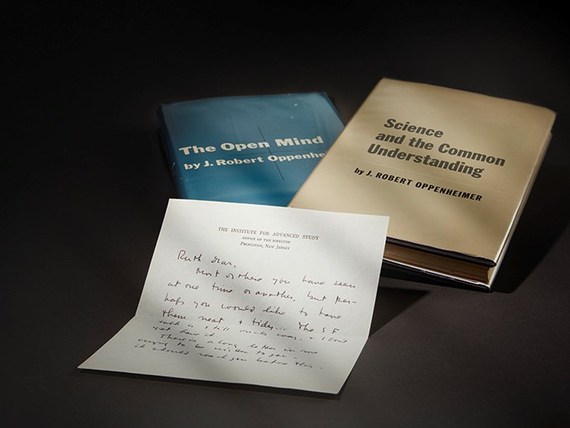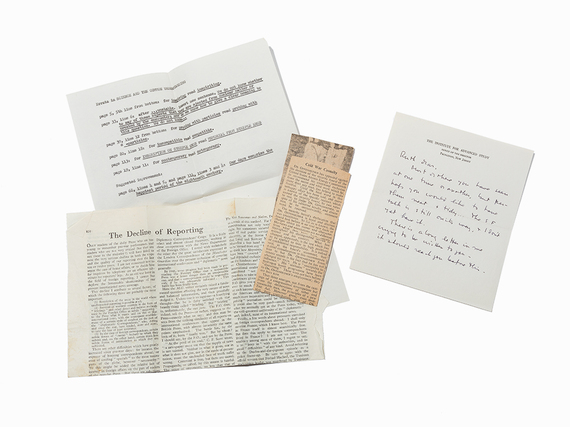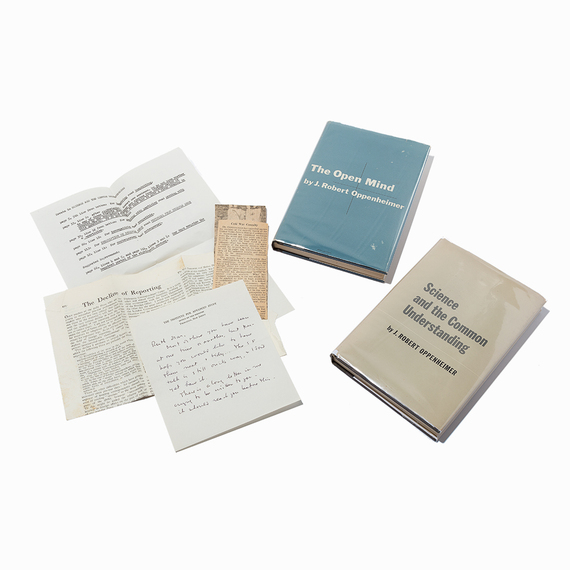J. Robert Oppenheimer was a man interested by mystic Eastern religions, a Communist sympathizer, and widely considered, "the father of the atomic bomb." Over 70 years after the Manhattan Project, the world is still reeling from the effects of dropping the atomic bombs on Hiroshima and Nagasaki. Amidst warnings of another nuclear arms race, the psychology behind massive warfare is increasingly vital. How do individuals lead to discoveries that kill thousands?
There are lessons to be learned by studying the lives of important 20th century nuclear scientists, such as Oppenheimer. When General Groves appointed Oppenheimer to head the Manhattan Project's secret weapons laboratory, he did so against the advice of others. Groves saw that Oppenheimer’s relentless ambition and vast scientific knowledge outweighed any concerns over left leaning politics. In his youth, Oppenheimer infamously preferred physics to friendship. Then, after World War II, he expressed genuine remorse for the deaths brought about by his work. How do we reconcile such a scientist with the man?
Shirley Streshinsky and Patricia Klaus tried to do just that through their 2013 publication, "An Atomic Love Story: The Extraordinary Women in Robert Oppenheimer's Life". Taking a humanist approach to Oppenheimer's legacy, Streshinsky and Klaus studied the man by looking at the different lives of the women he loved. Oppenheimer's great loves included: Jean Tatlock, his wife Kitty Harrison, and Ruth Sherman Tolman, the wife of Oppenheimer's friend and colleague on the Manhattan Project Richard Tolman.

Pair J. Robert Oppenheimer First Editions, with dedications to Ruth Sherman Tolman, news clippings, and a handwritten note from Oppenheimer to Tolman. Photograph courtesy of Auctionata, auction no. 530: Fine Books including Rare Bindings & Association Copies. Tuesday, May 17th, 2016, 4 pm EDT
According to Oppenheimer's aunt, Ruth Sherman Tolman was the scientist's "best true friend". Throughout their acquaintance, Tolman and Oppenheimer kept a correspondence. It is rumored that Tolman and Oppenheimer's respective spouses knew about the affair. Nonetheless, most of the evidence of the relationship has been destroyed, with only a few letters remaining. The surviving love notes between Tolman and Oppenheimer demonstrate their strong feelings for each other.
Tolman was ten years older than Oppenheimer when they met. She was a brilliant mind and a warm hearted person. Though Oppenheimer had just few close personal relationships, Tolman's ability to penetrate the minds of others broke through to Oppenheimer. It is no wonder that Tolman was also the first woman elected to the council of the Society for the Psychological Study of Social Issues and a clinical psychologist with the Office of Strategic Services (OSS) - the basis for the modern day Central Intelligence Agency (CIA). It was while working with the OSS that Tolman and Oppenheimer's relationship began. Tolman's government position and her closeness to other members of the Manhattan Project gave her a unique insight into Oppenheimer's moral conundrum. Tolman witnessed her husband's and her lover's excitement when the now infamous "Trinity" test explosion was successful.

Pair J. Robert Oppenheimer First Editions, with dedications to Ruth Sherman Tolman, news clippings, and a handwritten note from Oppenheimer to Tolman. Photograph courtesy of Auctionata, auction no. 530: Fine Books including Rare Bindings & Association Copies. Tuesday, May 17th, 2016, 4 pm EDT
Many members of the scientific community at the time hoped the terrifying possibility of the weapon would be enough to deter the war. A scientist from the Manhattan Project told General Groves about the successful test, with faith that it alone could end the war. Groves responded, "after we drop two bombs on Japan". On August 6th, 1945, President Truman broke the news that the largest bomb in history had been dropped on Hiroshima. Three days later, another bomb was released on Nagasaki. When early reports of the devastation got back to Oppenheimer the reality set in and the fog of ambition cleared. Oppenheimer saw the irrevocable change he had brought into the world. The war was over, the scientist's work was complete, but there was no peace for the man. Oppenheimer left for Washington for a two-week trip, where he would speak to both of the Tolmans about the need to control nuclear arms. He was an American hero for helping to end the war, while publically calling the bomb a terrible and brutal weapon.
In 1954, during the Second Red Scare, Oppenheimer lost his security clearance for of his outspokenness and Communist connections. Ruth Tolman's friendship supported him through the trial process. Letters between them are recorded in the Oppenheimer biography, "American Prometheus: The Triumph and Tragedy of J. Robert Oppenheimer". Tolman kept up with Oppenheimer's lectures and articles during this time, as evident by news clippings, notes, and inscribed editions "with love" from Oppenheimer to Tolman.
Oppenheimer's tragic regret illustrates the importance of not only recognizing the unyielding ambition of scientific brilliance, but also the value of regret and hindsight. Human beings, capable of affairs, love, and greatness, can also suffer folly. Hopes of ending a war, without lasting control of one's own discoveries, opened a Pandora's Box of future nuclear violence. To learn from Oppenheimer requires a keen memory of human regret and far reaching predictions into potential future ramifications.

Pair J. Robert Oppenheimer First Editions, with dedications to Ruth Sherman Tolman, news clippings, and a handwritten note from Oppenheimer to Tolman. Photograph courtesy of Auctionata, auction no. 530: Fine Books including Rare Bindings & Association Copies. Tuesday, May 17th, 2016, 4 pm EDT
Alli Arnold, Specialist | Auctionata New York